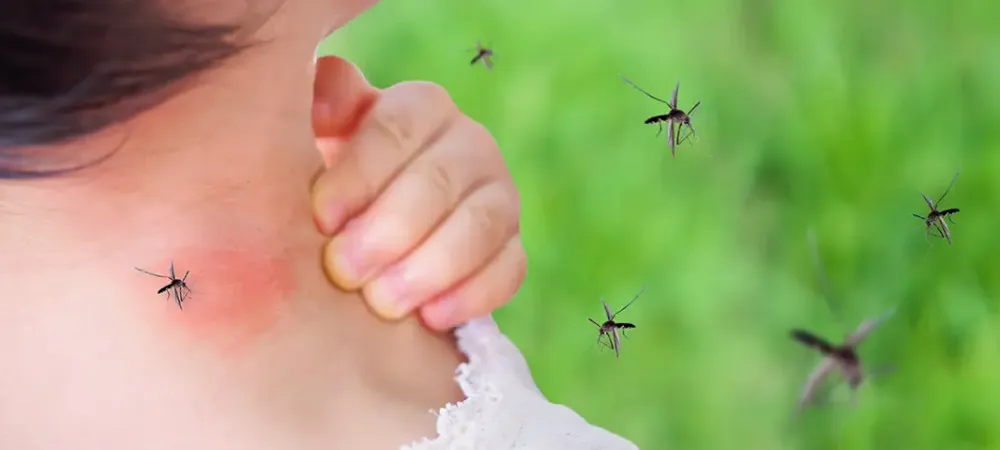What Attracts Mosquitoes to Humans?

If you feel like you’re a magnet for mosquito bites, you’re not imagining things. These tiny pests are surprisingly selective in who they target—and it turns out there’s real science behind their preferences.
In this post, we’ll dive into what attracts mosquitoes to humans, the biological cues they follow, and some of the most persistent myths about mosquito attraction. Armed with the right knowledge, you can take smarter steps to protect yourself and your family from bites.
What Are Mosquitoes Really Looking For?
Mosquitoes may be annoying, but their behavior is driven by survival. Specifically, female mosquitoes need blood to develop their eggs, so they’ve evolved to become expert hunters. Using a blend of sensory inputs—smell, sight, and heat detection—they zero in on their targets with remarkable accuracy.
Let’s break down what exactly draws mosquitoes to you.
1. Carbon Dioxide (CO₂) – The First Clue in Their Hunt
One of the primary attractants for mosquitoes is carbon dioxide, the gas we exhale when we breathe. Mosquitoes can detect CO₂ from up to 100 feet away, which acts as a homing signal alerting them that a living, breathing host is nearby.
The more you breathe out (especially during physical activity), the more attractive you become.
Who’s at higher risk?
- People who exercise outdoors
- Adults (larger people emit more CO₂ than children)
- Pregnant women (who exhale more CO₂ due to increased metabolic activity)
2. Body Heat and Moisture – A Warm, Welcoming Signal
Once a mosquito gets closer, body heat becomes a key indicator. These insects use thermal sensors to detect warmth, which helps them identify exposed skin and blood vessels.
Moisture from sweat adds to the appeal. It not only helps conduct heat more efficiently but also carries scent molecules that mosquitoes love.
Warm, moist areas they often target:
- Ankles
- Wrists
- Neck
- Armpits
3. Lactic Acid and Body Odor – Chemical Cues That Matter
When you sweat, your body releases lactic acid, ammonia, and other substances through your skin. Lactic acid, in particular, is a strong mosquito attractant.
Some people naturally produce more lactic acid due to genetics, fitness level, or diet. Higher body temperature and recent physical activity can also increase its output.
Fun fact: Even your personal body chemistry—affected by hormones, diet, and microbiome—can alter how attractive you are to mosquitoes.
4. Skin Microbiome – Your Invisible Signature
Your skin hosts billions of bacteria that contribute to your unique scent profile. The composition and diversity of your skin microbiome can determine how appealing you are to mosquitoes.
Interestingly, it’s not just how much bacteria you have—but what kind—that matters.
One study found that people with less diverse skin bacteria were more prone to bites, suggesting that certain bacterial combinations emit odors that mosquitoes find irresistible.
5. Blood Type – Does It Really Matter?
A popular theory is that mosquitoes prefer Type O blood. In a 2004 study, researchers found that mosquitoes landed on people with Type O nearly twice as often as those with Type A.
However, this doesn’t mean blood type alone determines your risk—many other factors come into play. Plus, mosquitoes don’t know your blood type until after they bite you, so their attraction is likely based on chemicals secreted through your skin that are linked to your blood type.
Debunking Common Myths About Mosquito Attraction
Now that we’ve covered the real reasons mosquitoes are drawn to you, let’s clear the air about some misconceptions that still circulate.
Myth #1: Mosquitoes Are Attracted to Sweet Blood
There’s no scientific basis for the idea that “sweet blood” makes you more of a target. Mosquitoes don’t taste sweetness the way we do—they’re focused on detecting body heat, CO₂, and scent. Your sugar intake has no measurable effect on mosquito preference.
Myth #2: Garlic, Bananas, or Vitamin B Repel Mosquitoes
Although it’s often claimed that eating garlic, bananas, or taking Vitamin B supplements will keep mosquitoes away, studies show no reliable connection. These remedies might slightly alter your scent, but not enough to deter a determined mosquito.
Myth #3: Only Some People Get Bitten
It might feel like mosquitoes play favorites—and to an extent, they do—but everyone gets bitten eventually. Some people are just more sensitive to the bites and develop more noticeable welts. Others may not react at all, making them think they’re immune.
Myth #4: Mosquitoes Are Attracted to Light Clothing
This one’s actually backward. Mosquitoes are more attracted to dark colors like black, red, and navy. Darker hues stand out visually against the horizon, especially at dusk, making it easier for mosquitoes to lock in on their target.
Need Help Controlling Mosquitoes in Your Yard?
At Sherrill Pest Control, we provide professional mosquito control treatments designed to protect your family and pets all season long. Serving Tennessee for 50 years, we know how to keep your outdoor spaces safe, comfortable, and bite-free.
Contact us today to schedule a consultation or learn more about our mosquito control services.
